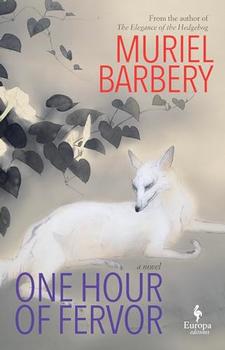Summary | Excerpt | Reviews | Beyond the Book | Readalikes | Genres & Themes | Author Bio

Dying
As he lay dying, Haru Ueno was looking at a flower and thinking, It's all been about a flower. There were, in fact, three threads to the narrative of his life, and only the last one was a flower. Stretching before him was a small temple garden that sought to be a miniature landscape, scattered with symbols. It was a wonder to him that centuries of spiritual seek-ing had ended in this precise arrangement—so much striving for meaning and, in the end, pure form, he thought, too.
For Haru Ueno was a seeker of form.
He knew he was about to die, and he thought, At last I'm in accordance with things. The gong at the Hōnen-in sounded in the distance, four times, and he felt so intensely alive to the world that it made him dizzy. There before him, the garden enclosed by white-washed walls topped with gray tiles. In the garden, three stones, a pine tree, an expanse of sand, a lantern, some moss. In the distance, the mountains of the East. The temple itself was known as the Shinnyo-dō. Every week for almost five decades Haru Ueno had taken a walk around the same loop: he went to the main temple on the hill, through the cemetery below it, and back to the entrance to the complex, where he was an important benefactor.
For Haru Ueno was a very rich man.
He had grown up watching the snow fall and melt on the stones of a mountain torrent. The little family house stood firmly on one bank. On the other was a forest of tall pine trees in the ice. He had long believed it was matter he loved—rock, water, leaves, and wood. Once he understood it was the form this matter took that he loved, he became an art dealer.
Art: one of the three threads of his life.
Of course, he didn't become an art dealer overnight. It had taken time to move to another city and meet a man. At the age of twenty, he had turned his back on the mountains and his father's sake business, and left Takayama for Kyōto. He had neither money nor connections, but he possessed a rare piece of good fortune: while he knew nothing of the world, he knew who he was. It was the month of May, and, seated on the wooden floor, he caught a glimpse of the future with a clarity that was close to the lucidity sake gives. All around, he could hear the bustle of the complex of Zen temples, where a cousin who was a monk had arranged a room for him. The encounter between the force of his vision and the immensity of time made his head spin. This vision did not say where, or when, or how. It said: A life devoted to art. And: I shall succeed. The room looked out on a tiny shady garden. In the distance, the sun gilded the stalks of tall gray bamboo. Water irises grew among the hostas and dwarf ferns. One of the irises, taller and more slender than the others, was swaying in the breeze. Somewhere a bell was tolling. Time contracted, and Haru Ueno was that flower. Then the moment passed.
On this day, fifty years later, Haru Ueno gazed at the same flower and was astonished that once again it was the twentieth of May at four o'clock in the afternoon. One thing, however, was different: this time, he was looking at the flower in himself. Another element was the same: everything—the iris, the bell, the garden—was there in the present. A final observation was remarkable: in this total present, the pain faded away. He heard a sound behind him and hoped he would be left alone. He thought of Keisuke, who was waiting somewhere for him to die, and told himself, A life can be summed up in three names.
Haru, who did not want to die. Keisuke, who could not die. Rose, who would live.
The private quarters where he was lying were those of the temple's head monk, who was the twin brother of Keisuke Shibata, thanks to whom he'd found his vocation. The Shibata brothers descended from an old Kyōto family who, for as long as anyone could remember, had provided the city with monks and lacquerers. Since Keisuke despised both religion and—because of its shine—lacquer, he had opted for pottery, but he was also a painter, calligrapher, and poet. What was remarkable about Haru and Keisuke's encounter was that, at the very beginning, there had been a bowl between them. Haru saw this bowl and knew what his life would be. He'd never come across such a work of art: the bowl seemed both new and very old, in a way that he'd thought was impossible. Next to it, sprawled on a chair, was a man of indeterminate age and—could this make sense?—of the same alloy as the bowl. On top of it, he was dead drunk, and Haru found himself confronted with an equation that was equally impossible: on the one hand, perfect form, and on the other, its creator: a drunkard. Once they'd been introduced, they placed the seal, with sake, on what would become the friendship of a lifetime.
Excerpted from One Hour of Fervor by Muriel Barbery. Copyright © 2024 by Muriel Barbery. Excerpted by permission of Europa Editions. All rights reserved. No part of this excerpt may be reproduced or reprinted without permission in writing from the publisher.
Your guide toexceptional books
BookBrowse seeks out and recommends the best in contemporary fiction and nonfiction—books that not only engage and entertain but also deepen our understanding of ourselves and the world around us.